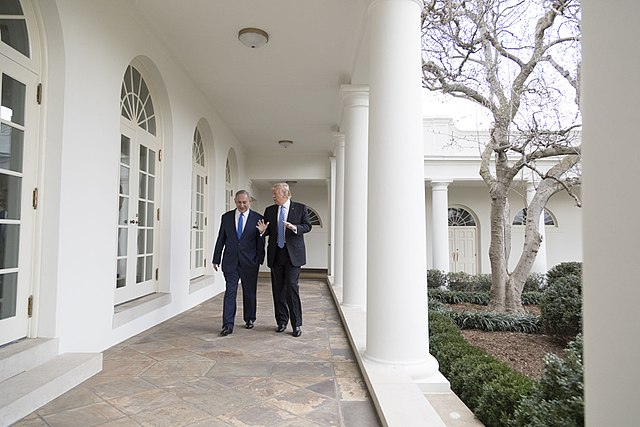by Laila Ujayli
In blatant violation of international law, Donald Trump has recognized Israel’s claim to sovereignty over the Golan Heights. The order came in the midst of a renewed wave of violence in the Gaza Strip, with Israel responding to rocket attacks with a characteristically disproportionate slew of airstrikes. Tensions are still high in Gaza, which is becoming increasingly uninhabitable.
The lives and homes that continue to be lost in both Gaza and Israel only underscore the importance of negotiating a good-faith solution to one of the Middle East’s most central and devastating conflicts. Trump’s latest move, however, appears designed to bolster Israeli Prime Minister Benjamin Netanyahu ahead of Israel’s elections on April 9 and entrench a ruling party whose policies aggravate the situation on the ground and work in direct opposition to long-held U.S. positions. This support of Netanyahu and capitulation to the Israeli far right comes at the expense of thousands of Syrian and millions of Palestinian lives.
Israel displaced tens of thousands of Syrians when it seized the Golan during the 1967 Arab-Israeli War and prohibited them from returning to their homes. Later, the United Nations unequivocally condemned Israel’s 1981 unilateral annexation of the Golan, with the Security Council asserting in Resolution 497 that Israel’s “decision to impose its laws, jurisdiction and administration in the occupied Syrian Golan Heights is null and void and without international legal effect.” Seizing and annexing a territory through military force is prohibited under international law. The United States relied on this principle to condemn Russia’s annexation of the Crimea, so Trump’s decision also gives Putin cause to celebrate.
Thousands of Druze still live in the Golan and retain their Syrian identity, even as Israel’s settlements have expanded beyond the “defensive” security installations that justified the Golan’s occupation in the first place. As Human Rights Watch has noted, the Trump administration’s decision works to undercut the protections afforded to these Syrians under the law of occupation, which includes “the prohibition against building settlements and extracting natural resources for the benefit of the occupier.” Israel, of course, continues to engage in both prohibited activities with little protest from the United States. With Trump’s order, however, the United States will no longer recognize these protections.
Denying the reality of the Golan’s occupation adds to Trump’s already long repertoire of policies that hurt the Syrian people. In addition to exploiting the current situation in Syria to justify this shift in U.S. policy, Trump’s Muslim Ban bars Syrian nationals from entering the country, and his FY2020 budget request seeks to eliminate all U.S. stabilization funding for Syria—despite the U.S. role in destroying vital infrastructure in cities like Raqqa. By gifting the Golan to Netanyahu, Trump also enshrines an occupation that effectively assigns Muslims in the Golan second-class citizenship under Israel’s racist nation-state law.
Trump’s decision to change the Golan’s status under U.S. policy also has troubling consequences for Palestinians. Rather than sanction Netanyahu for his election deal with far-right parties that promote hate and for his advancement of settlement policies that violate international law, Trump is encouraging and empowering the re-election of a prime minister who would undoubtedly continue the erosion of Arab Israeli and Palestinian rights. Netanyahu is already claiming that the decision sets a precedent for annexation that could justify a similar designation for large swathes of the West Bank.
While encouraging Netanyahu, Trump has stripped aid funding to Palestinians and continued to perpetuate the status quo in Israel, even as the United Nations accuses Israel of potential war crimes in Gaza for murdering unarmed protesters, including children. In October, he also signed into law the 2018 Anti-Terrorism Clarification Act (ATCA), which “stipulates that foreign governments which accept aid from the U.S. government will be eligible for prosecution in U.S. courts for damages as a result of terrorism.” Since that provision could make the Palestinian Authority (PA) financially liable in U.S. courts, the PA said it could no longer accept U.S. aid, forcing USAID and U.S. NGOs to leave Gaza and the West Bank.
Trump’s recent order does not change the reality of the ground. The Golan Heights is occupied Syrian land, recognized as such under international law. But Trump’s designation degrades the already tattered U.S. legitimacy in the region, providing further proof that Jared Kushner is wasting a lot of jet fuel and taxpayer dollars pointlessly flitting about the Middle East with his “peace plan.”
But beyond U.S. credibility and the Israeli elections, the Golan Heights is home to thousands of people who will be directly hurt by this decision. Palestinians will also bear the brunt of an emboldened Israeli far-right wing, making peace in the region seem less and less achievable. As the 2020 elections inch closer, the crowded field of Democratic candidates must be prepared to present a robust Middle East policy and a clearly delineated path forward to undo the damage Trump has caused.





